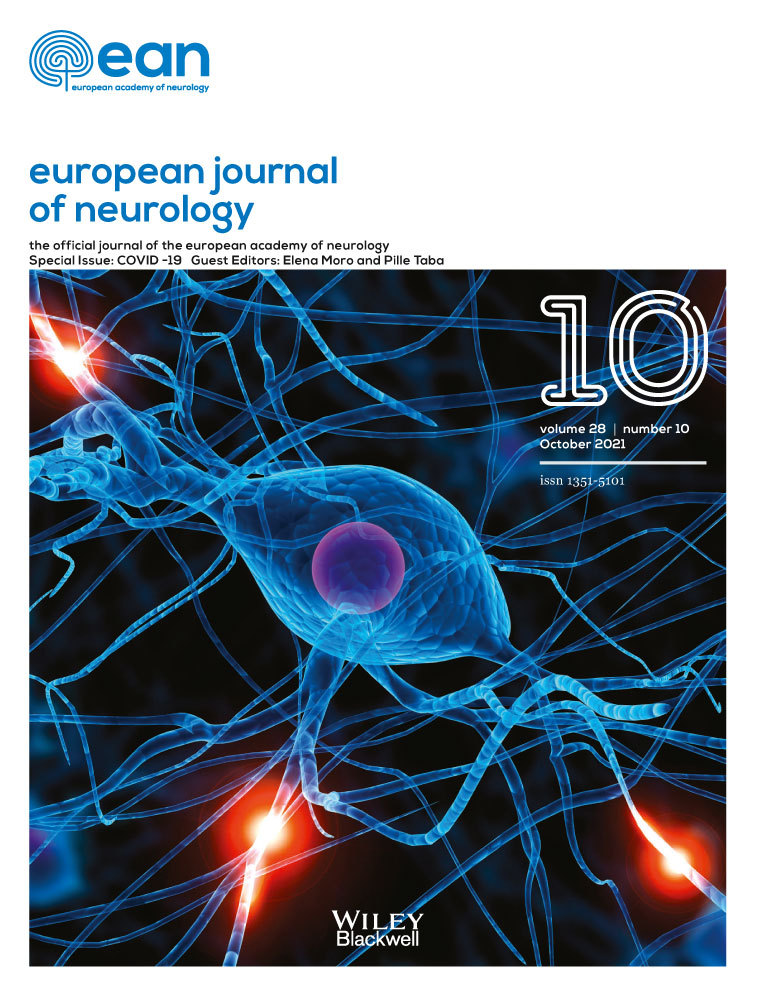Outcomes of coronavirus disease 2019 in patients with neuromyelitis optica and associated disorders
Abstract
Background
Outcomes of coronavirus disease 2019 (COVID-19) in patients with neuromyelitis optica spectrum disorders (NMOSD) or myelin oligodendrocyte glycoprotein antibody-associated disease (MOGAD), often treated with immunosuppressive therapies, are still unknown.
Methods
We conducted a multicenter, retrospective, observational cohort study among all French expert centers for neuromyelitis optica and related disorders. Patients with NMOSD or MOGAD included in the study received a confirmed or highly suspected diagnosis of COVID-19 between 1 March 2020 and 30 June 2020. Main outcome was COVID-19 severity score assessed on a seven-point ordinal scale ranging from 1 (not hospitalized with no limitations on activities) to 7 (death).
Results
Fifteen cases (mean [SD] age: 39.3 [14.3] years, 11 female) were included. Five patients (33.3%) were hospitalized, all receiving rituximab. A 24-year-old patient with positive aquaporine-4 antibody, with obesity as comorbidity, needed mechanical ventilation. Outpatients were receiving anti-CD20 (5), mycophenolate mofetil (3) or azathioprine (3). They were younger (mean [SD] age: 37.0 [13.4] years), with a longer disease duration (mean [SD]: 8.3 [6.3] years) and had a lower expanded disability severity score (EDSS) score (median [range] EDSS: 2.5 [0–4]) relative to patients requiring hospitalization (mean [SD] age: 44.0 [16.4] years, mean [SD] disease duration: 5.8 [5.5] years, median [range] EDSS: 4 [0–6.5]).
Conclusions
COVID-19 outcome was overall favorable in this cohort. Larger international studies are needed to identify risk factors of severe COVID-19; however, we recommend personal protective measures to reduce risk of SARS-CoV-2 infection in this immunocompromised population.
CONFLICT OF INTEREST
C. Louapre has received consulting or travel fees from Biogen, Novartis, Roche, Sanofi, Teva and Merck Serono, none related to the present work. E. Maillart reports personal fees from Biogen, Merck, Novartis, Roche, Sanofi-Genzyme and Teva, and grants from Novartis and Roche, none related to the present work. C. Papeix has received consulting and lecturing fees and travel grants from Biogen, Genzyme, Novartis, Merck, Roche, Sanofi and Teva Pharma, none related to the present work. A. Wahab has received expert testimony fees from Genzyme and Roche, and travel grants from Biogen and Roche, none related to the present work. G. Mathey received travel fees from Biogen, Novartis, Sanofi-Genzyme, Merck, Teva and Roche, none related to the present work. N. Collongues serves on scientific advisory boards for, and has received honoraria from, Biogen Idec, Merck Serono, Sanofi-Genzyme, Bayer Schering Pharma and Alexion Pharmaceutical, none related to the present work. J. De Sèze has received consulting fees from Biogen, Roche, Novartis, Teva, Cellgen, Jansen and Sanofi-Genzyme, and contracted research from Novartis and Sanofi-genzyme, none related to the present work. S. Zeidan, D. Biotti, Z. Lepine, M. Zedet, P. Labauge, C. Tilikete, J. Pique, A. Tourbah, D. Dimitri Boulos, P. Branger, L.D. Kremer and R. Marignier have no disclosures.
Open Research
DATA AVAILABILITY STATEMENT
The data that support the findings of this study are available on request from the corresponding author. The data are not publicly available due to privacy or ethical restrictions.




